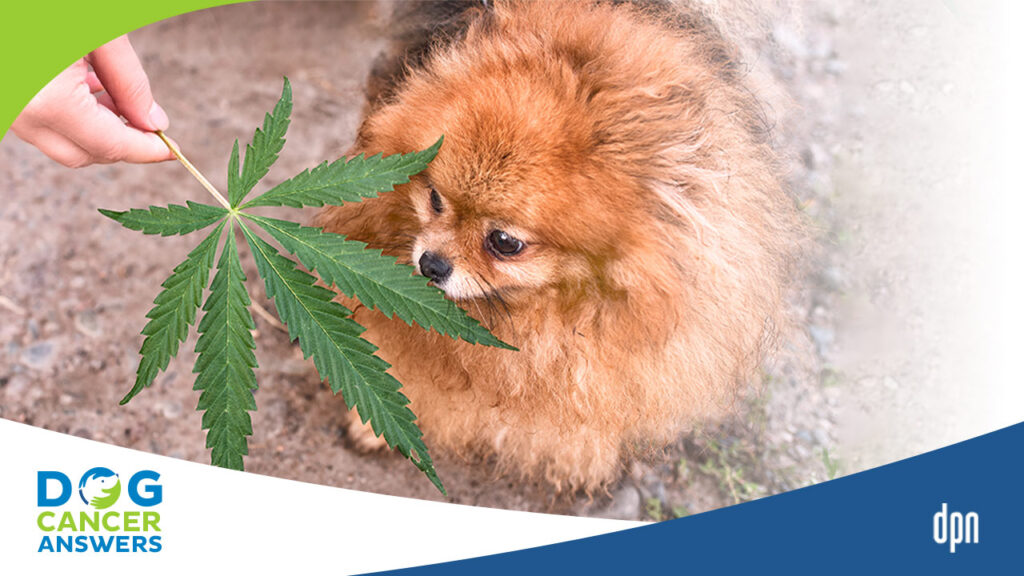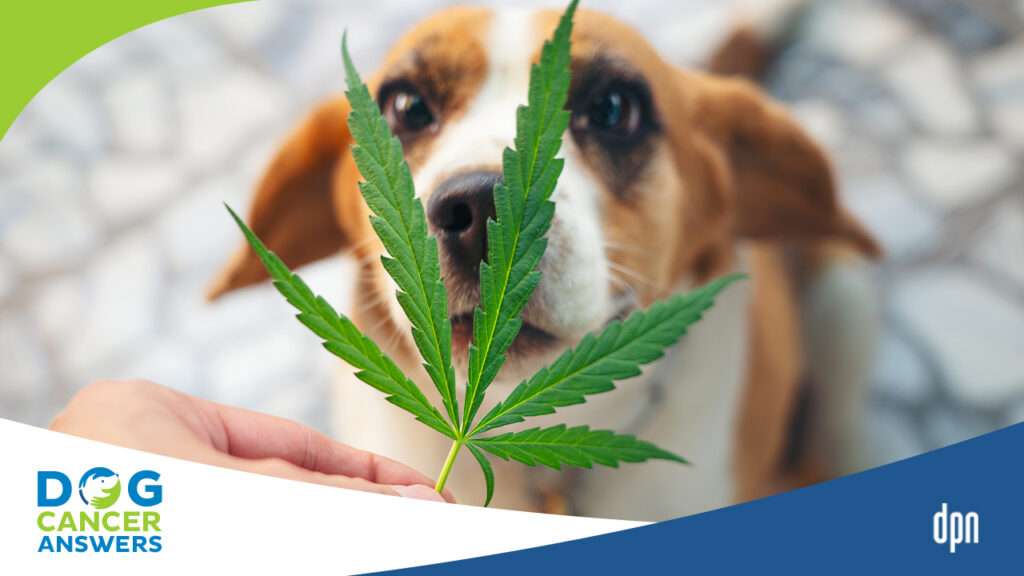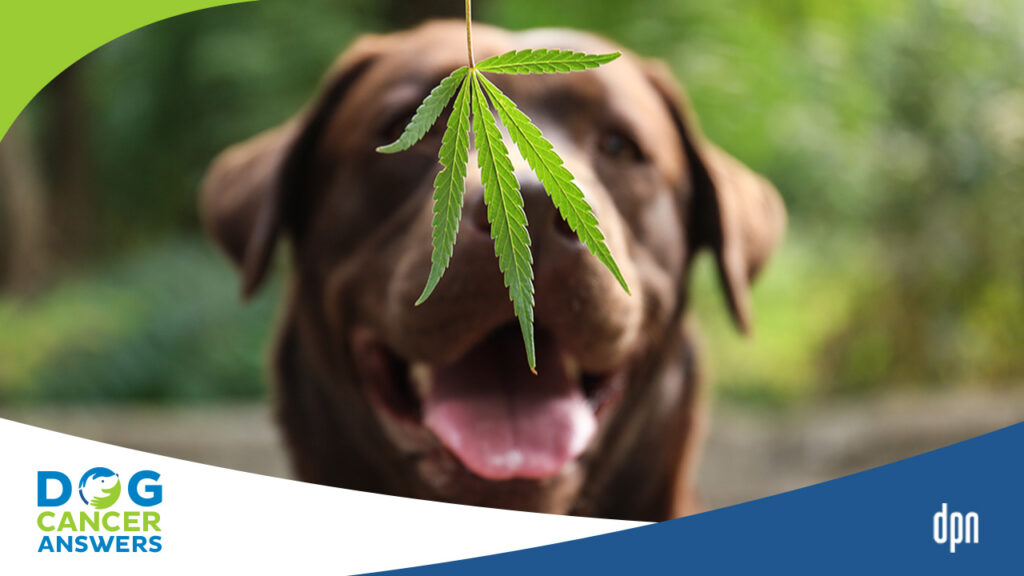Cannabidiol (CBD) can be a great addition to your pet’s home care routine, especially in a hospice case. It can help reduce side effects of chemotherapeutics and reduce inflammation.
Key Takeaways
- CBD can help with dog cancer side effects.
- Dogs with cancer who are on prednisone should not take CBD oil.
- You can give your dog CBD for pain relief from cancer, but run it by your vet first to make sure that it won’t interact with your dog’s other medications.
What is CBD?
Discussing CBD and cannabis can get confusing quickly, so let’s start with a few basic definitions.
- Cannabis is a plant.
- Cannabis has many chemical compounds, but the two most famous are cannabidiol (CBD) and tetrahydrocannabinol (THC).
- THC is psychoactive (gets you high). CBD does not have psychoactive effects. 1
CBD (and THC) can come from either marijuana or hemp. What’s the real difference between these two cannabis plants? THC content:
- Cannabis is referred to as marijuana if it contains more than 0.3% THC.
- Cannabis is referred to as hemp if it contains 0.3% THC or less.8
CBD is safe for dogs, but THC, the main natural compound in cannabis, is toxic for pets in high amounts.2
CBD is generally safe, but THC can be toxic in high amounts.
Actives: THC vs. CBD
The United States Drug Enforcement Administration (DEA) lists marijuana and its cannabinoids as Schedule 1 controlled substances.3
After THC, cannabidiol (CBD) is the most active component of the cannabis plant. It is derived directly from the hemp plant or manufactured in a lab.
Using Medical Marijuana in Dogs
In humans, medical marijuana contains THC, which is toxic to dogs. While THC will likely not kill your pet, it can induce negative side effects. Ongoing research needs to be done to find a therapeutic dose for THC to be established as safe and helpful for dogs.5
Until we know more, the safest choice of cannabis for dogs is CBD with less than 0.3% THC.
CBD from Cannabis for Dogs
Studies evaluating cannabis in veterinary medicine are ongoing, but business is booming. Various formulations and brands are available for dogs, including flavored chews, capsules, dog treats, honey, and oil products. CBD oil can also be added to food, and there are topical ointments to be rubbed on the skin or ears. We’ll discuss how to choose a CBD product below.
Dr. Narda Robinson was on the scene investigating cannabis for use in dogs as soon as Colorado made it legal. Wild stories!
Cannabis Strains Sativa and Indica
You might see the names “sativa” and “indica” thrown around with cannabis products. These are two different types of cannabis. Some people consider these to be two different strains of the single species cannabis, while others consider them to be separate species (as in Cannabis sativa and Cannabis indica).
More separate species have also been suggested. Even botanical taxonomists don’t all agree about whether cannabis is one single species with many different strains or a genus with multiple species and strains within those.4
THC content should be no higher than 0.3% for dogs
The bottom line for us as dog lovers is that no matter which strain (or species) we choose, what matters most when choosing a product is the THC content. THC content should be no higher than 0.3% for dogs.
How CBD for Dogs with Cancer Helps
Except for anecdotes, little is known about how CBD affects dogs; however, research is ongoing.6
There are some things we know for sure, however. For example, we know that dogs have an endocannabinoid system, just like people do.
In fact, it has been shown that dogs have a higher concentration of CB1 cannabinoid receptors (the receptors which are activated by cannabinoids) in their brains than humans.2
Dogs have more CB1 receptors than we do.
This system is a series of receptors throughout the body that modulates pain, inflammation, anxiety, and nausea. CBD acts on these receptors and can help manage these issues.7
Cancer Side Effects
Specifically in dogs, CBD has been suggested to ease some of the side effects of cancer and its treatments:2
- ease pain
- reduce inflammation
- relieve anxiety
- resolve nausea
- improve appetite
- reduce seizures
Direct Cancer Treatment?
CBD also shows promise for helping treat cancer directly. For example, CBD can slow the growth of and cause death to certain types of cancer cells grown in the lab.3
One study showed that cell cultures from different types of canine cancers exposed to CBD oil showed a significant decrease in the reproduction of the cancer cells.6,9
- The cancer types involved in this study were osteosarcoma, lymphoma, and mammary carcinoma.6
- The study also showed that CBD combined with vincristine, a commonly used chemotherapeutic in veterinary medicine, had synergistic effects.9
- A word of caution: the potential interactions with traditional chemotherapies need further evaluation.
Another study found that CBD caused apoptosis (cell death) and mitochondrial function impairment in canine gliomas, a primary brain tumor.10
Dr. Trina Hazzah, founder of the Veterinary Cannabis Society, explains why she sees so much promise in this plant.
Common Uses of CBD for Dogs
As mentioned above, CBD is thought to have several properties, including being an anti-inflammatory, immune modulator, pain reducer, anti-seizure and anti-nausea support.3,7 CBD could be used to help dogs experiencing any of these symptoms.
In both animals and humans, CBD has also been shown to be helpful with anxiety, insomnia, and chronic pain.1
In dogs, CBD has been shown to help with some non-cancer problems, as well:
- improve comfort and activity with osteoarthritis7
- reduce seizures in epileptic dogs2
For canine cancer, CBD is typically used as part of palliative care or a hospice program rather than for its potential anti-cancer ability in itself.5 That may change as we learn more, particularly if it goes off Schedule 1 and is easier to discuss and prescribe.
CBD may help with comfort care.
In the meantime, in many states CBD may be used as part of an integrative treatment plan overseen by your veterinarian.
Safety and Side Effects
CBD is a relatively new treatment option, and there is still a great deal that we don’t know about drug interactions, ideal dosage, and side effects. We do know that CBD can have side effects in dogs, including:2
- vomiting
- diarrhea
- elevated liver enzymes
- ataxia (balance issues, like stumbling or “acting drunk”)
- drowsiness
CBD can also affect the way your dog metabolizes other medications. It might make some medications more effective and can increase the side effects of others.
That’s why you should always discuss CBD with your veterinarian before giving it to your dog so that you can make sure it doesn’t interfere with any other medications or supplements your dog may be taking.
Giving CBD with Other Treatments
CBD is believed to be safe to give along with chemotherapy because laboratory studies on canine cancer cells have shown a synergistic effect between CBD and several chemo drugs.2 CBD can also be beneficial for relieving side effects from chemotherapy.2
That said, there is still a lot that we don’t know about how CBD interacts with other treatments, as very few clinical studies have been done looking at real dogs with cancer. Individual veterinarians may or may not be willing to try it, and we will discuss below why the regulatory environment might make talking about it hard for your veterinarian.
There are no known interactions with other supplements, but all supplement usage should be discussed with a veterinarian.
When to Not Use CBD for Dogs
Use CBD with caution in dogs with a history of elevated liver enzymes or pre-existing liver disease, because it tends to elevate ALK phosphate levels, a liver marker. We don’t yet know why ALK phosphate levels are increased with CBD use, but other liver values aren’t changed. Until we know more about how this may or may not be affecting the liver, it’s best to use with caution. For example, your veterinarian will want to monitor your dog’s liver values.11
CBD should be used with caution in some cases
CBD should also not be given to dogs receiving immunotherapy, as CBD may interfere with its effectiveness.2
In humans, CBD has been found to interact with a variety of drugs. CBD should be used with caution if your dog is taking:12
- steroids such as prednisone
- tramadol
- amitriptyline
There are likely other potential drug interactions, so always discuss adding CBD with your vet to ensure it won’t interfere with other medications your dog is taking.
Which CBD and Cannabis Products Should I Consider?
This is a tough question to answer directly. The regulatory environment in the U.S. means that some veterinarians can discuss and even prescribe CBD and cannabis, and others would lose their license just for saying the letters “CBD.”
CBD’s legal gray zone means your veterinarian might risk losing their license if they discuss it with you.
Federal Ban Makes Problems for Medical Advice
Because of the federal ban on cannabis and few studies that help us understand all of these compounds, many veterinarians are in the dark unless they have specifically sought this information and used it in their practices.
Dr. Demian Dressler explains the reason your veterinarian might not be able to discuss CBD with you.
Quality Control and Standardization Vary
There is also a lack of quality control or standardization across brands. Two labels might look identical to you and me, but be very different from each other. A veterinarian might be familiar with one product and how it seems to help (or hurt) … but not be able to make a confident recommendation about another product from another company.
Find a Veterinarian and Brand You Trust
Our best advice is to find a veterinarian who uses cannabis and get their input on your dog’s specific case, what brand and product to use, and how to administer the product.
If you can’t do that, choose a trusted brand and rely on the company’s recommendations. Look for ones intended for use in dogs. Products intended for humans can include ingredients that are toxic for dogs, such as chocolate or xylitol (also sometimes listed as birch sugar).
Trust CBD Companies to Give Supplement Advice?
It’s strange but true that we must rely on this “apothecary” approach for now in the U.S. This will continue until the federal regulations are changed and veterinarians can freely use and understand these supplements, just like they can any other supplement.
Choose products made for dogs, that do not include toxins like chocolate and xylitol.
How to Give CBD to Dogs
CBD is given as a supplement by mouth twice daily. Refer to the dosing information on your particular product and consult with your veterinarian or a holistic vet to determine the ideal dosage schedule for your dog.
There are no current “hard and fast” rules yet, but there are some guidelines.
- A dose that has been used in studies is 2mg/kg of CBD per dog’s body weight, twice a day.
- Another option is to give 0.3mg/kg of CBD twice a day and gradually increase until you find the dose your dog responds to. This might allow you to give less CBD while still helping your dog.2
Go Low and Slow
If giving a product that contains THC (for example, a “full spectrum” product), start with a very low dose and give it for 14 days. If you see an improvement, gradually increase up to the desired dose of CBD. This “low and slow” method decreases the risk of side effects or toxicity from THC.2
What If My Dog Gets High?
It is never acceptable for your dog to show signs of THC toxicity or “high” – if this happens, decrease future doses and consider a different product. Your dog may also need supportive veterinary care.
What If I Miss a Dose?
Give the next dose when you remember. If it is close to the next dosing schedule, skip the missed one and continue the normal schedule.
Do not give a double dose, as this can increase the risk of side effects.
Storage and Handling
Typically, CBD products are stored at room temperature, out of reach of children and pets. Follow specific manufacturing instructions for your chosen product.
Our Take on CBD for Dogs
There is currently a lack of direct evidence that CBD directly treats canine cancer, but it seems to have many benefits that are helpful for dogs with cancer. CBD products may be a good component of a comprehensive cancer treatment plan.
CBD gets the green light for palliative care in general.
CBD products do get the green light as a palliative or hospice care option for pets suffering from end-stage cancer or other end-stage diseases. It is worth asking your veterinarian about CBD supplements if your dog is in pain or has another condition affecting quality of life.
- Grinspoon P. Cannabidiol (CBD): What we know and what we don’t. Harvard Health Publishing. https://www.health.harvard.edu/blog/cannabidiol-cbd-what-we-know-and-what-we-dont-2018082414476. Published September 24, 2021. Accessed February 9, 2023.
- Hazzah T, Andre C, Richter G, McGrath S. Cannabis in veterinary medicine: A critical review. American Holistic Veterinary Medical Association. https://www.ahvma.org/wp-content/uploads/Cannabis-in-Veterinary-Medicine-A-Critical-Review-Vol-61_LR-3-2.pdf. Published 2020. Accessed April 29, 2023.
- Marijuana and cancer. American Cancer Society. https://www.cancer.org/treatment/treatments-and-side-effects/treatment-types/complementary-and-integrative-medicine/marijuana-and-cancer.html#:~:text=More%20recently%2C%20scientists%20reported%20that,of%20some%20forms%20of%20cancer. Published July 3, 2022. Accessed February 9, 2023.
- Piomelli D, Russo EB. The cannabis sativa versus cannabis indica debate: An interview with Ethan Russo, MD. Cannabis and Cannabinoid Research. 2016;1(1):44-46. doi:10.1089/can.2015.29003.ebr
- Hazzah T, Richter G. Cannabis products in small animal medicine. Today’s Veterinary Practice. https://todaysveterinarypractice.com/integrative-medicine/cannabis-products-in-small-animal-medicine/. Published August 29, 2022. Accessed February 9, 2023.
- Albright SM. Promising research on the use of CBD to treat canine cancer. AKC Canine Health Foundation. https://www.akcchf.org/educational-resources/library/articles/promising-research-on-the-use.html. Published March 22, 2021. Accessed February 9, 2023.
- Gamble L-J, Boesch JM, Frye CW, et al. Pharmacokinetics, safety, and clinical efficacy of cannabidiol treatment in osteoarthritic dogs. Frontiers in Veterinary Science. 2018;5. doi:10.3389/fvets.2018.00165
- Agriculture Improvement Act of 2018. Congress.gov. https://www.congress.gov/115/bills/hr2/BILLS-115hr2enr.pdf. Published December 20, 2018. Accessed April 29, 2023.
- Henry JG, Shoemaker G, Prieto JM, Hannon MB, Wakshlag JJ. The effect of cannabidiol on canine neoplastic cell proliferation and mitogen‐activated protein kinase activation during autophagy and apoptosis. Veterinary and Comparative Oncology. 2021.
- Gross C, Ramirez DA, McGrath S, Gustafson DL. Cannabidiol induces apoptosis and perturbs mitochondrial function in human and canine glioma cells. Frontiers in Pharmacology. 2021;12. doi:10.3389/fphar.2021.725136
- Judd B. CBD use in dogs: An update. Veterinary Partner. https://veterinarypartner.vin.com/default.aspx?pid=19239&id=10809483. Published March 11, 2022. Accessed February 9, 2023.
- Wilson-Morkeh H, Al-Abdulla A, Sien L, Mohamed H, Youngstein T. Important drug interactions exist between cannabidiol oil and commonly prescribed drugs in rheumatology practice. Rheumatology. 2019;59(1):249-251. doi:10.1093/rheumatology/kez304
Topics
Did You Find This Helpful? Share It with Your Pack!
Use the buttons to share what you learned on social media, download a PDF, print this out, or email it to your veterinarian.









